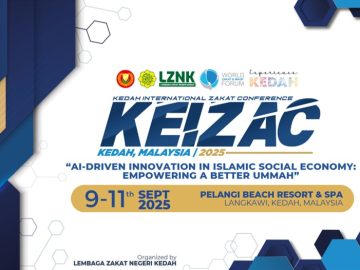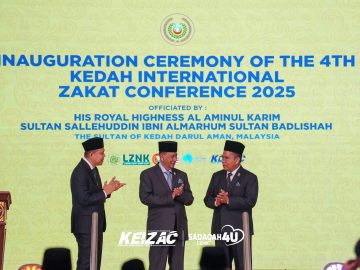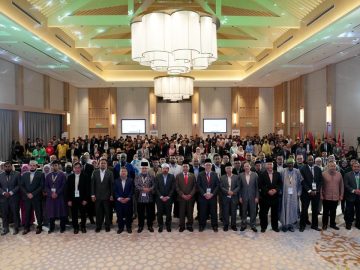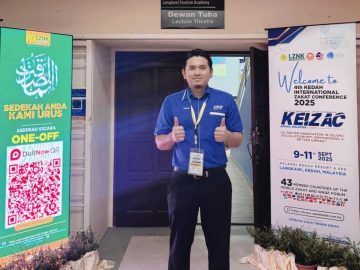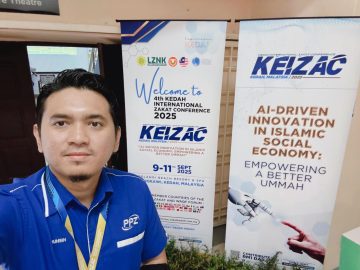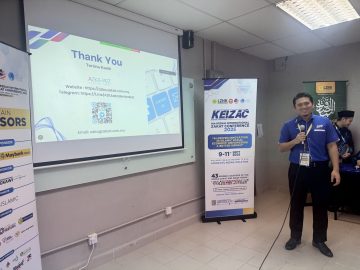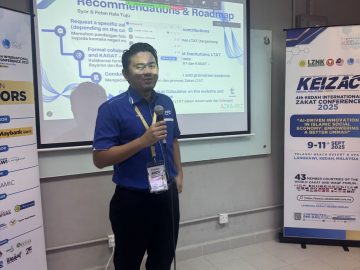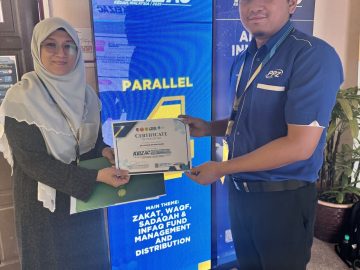Langkawi Island, Kedah, 9–11 September 2025 – The 4th Kedah International Zakat Conference (KEIZAC 2025), themed “AI-Driven Innovation in Islamic Social Economy: Empowering A Better Ummah”, gathered global experts, scholars, and practitioners to discuss the future of zakat, waqf, and Islamic social finance in the age of digital transformation.
This prestigious event served as a platform to exchange critical ideas on the role of technology, research, and collaboration in shaping the Islamic social economy, while also addressing challenges such as governance, digital integrity, and sustainable community empowerment.
AZKA’s Strong Presence at KEIZAC 2025
Akademi Zakat (AZKA-PPZ) was actively engaged throughout KEIZAC 2025. Our involvement underscored AZKA’s role as a knowledge leader and research hub for advancing zakat literacy, policy, and practice. The conference highlighted how institutions like AZKA are essential in bridging academic research with real-world solutions, ensuring that zakat and waqf continue to remain relevant and impactful in today’s rapidly evolving environment.
AZKA’s participation also aligned with our ongoing mission: to empower society through impactful research, collaboration with universities and corporates, and advocacy for zakat as a dynamic instrument of socio-economic justice.
Paper Presentation: Zakat on LTAT Contributions: Ownership, Eligibility, and Implementation Challenges
As part of the parallel sessions under the theme Zakat, Waqf, Sadaqah & Infaq Fund Management and Distribution, I had the privilege of presenting my paper titled “Zakat on LTAT Contributions: Ownership, Eligibility, and Implementation Challenges”.
This paper explored the emerging issue of zakat on Lembaga Tabung Angkatan Tentera (LTAT) contributions — a topic that has long been under-discussed in the zakat discourse. Key insights shared include:
Ownership Questions: At what stage do contributors truly ‘own’ their LTAT savings, and how does this impact zakat liability?
Eligibility (Asnaf & Muzakki): Determining who is obligated and under what conditions zakat should be levied.
Implementation Challenges: The lack of fatwa guidance, limited public awareness, and operational complexities that need to be addressed before any formal imposition of zakat on LTAT can take place.
I emphasised that collaboration, clear guidelines, and structured awareness campaigns are essential for strengthening the future implementation of zakat on LTAT. Only with these in place can the potential of this zakat category be fully realised for the benefit of the ummah.
Key Takeaways from the Conference
KEIZAC 2025 was rich with knowledge-sharing. Among the highlights:
Digitalisation of Zakat & Waqf: Institutions showcased blockchain applications, AI-driven beneficiary profiling, and real-time zakat dashboards, proving how technology enhances trust and transparency.
Shariah and Social Justice: Speakers stressed the importance of maqasid al-shariah in guiding innovation so that digital tools empower, rather than compromise, social equity.
Global Collaboration: Participants from Indonesia, Singapore, Nigeria, Thailand, Jordan, and beyond shared successful models of zakat and waqf, inspiring new opportunities for Malaysia’s institutions.
Green Zakat and Sustainability: Emerging frameworks such as the Green Zakat Framework emphasised the need to link zakat with climate resilience and ecological balance.
These sessions reinforced AZKA’s conviction that innovation must go hand-in-hand with Islamic principles, ensuring that technology serves humanity and faith.
Moving Forward
AZKA’s involvement in KEIZAC 2025 reaffirmed our commitment to thought leadership, research excellence, and practical engagement in shaping the future of zakat. The discussions and networking opportunities provided fresh momentum to explore:
New zakat categories such as LTAT contributions, FCPO, and Sukuk,
Deeper integration of AI and big data into zakat systems, and
Stronger partnerships across academic, corporate, and policy institutions.
Through initiatives like KEIZAC, AZKA continues to champion the vision of zakat not only as a religious obligation but also as a transformative force for economic resilience, social justice, and ummah empowerment.
✨ We extend our gratitude to Lembaga Zakat Negeri Kedah (LZNK) for hosting this impactful conference, and to all knowledge partners for their invaluable insights. AZKA looks forward to continued collaboration and collective progress in advancing the Islamic social economy.
📑 For those interested in exploring the full presentation slides, the materials can be accessed via the following link:
👉 https://drive.google.com/drive/folders/1E4jdP4v8zTInx0G-J0XdyniqoXQLUlgO?usp=drive_link

